The rich visual filmmaking of The Social Network
Jim Emerson has a great post about the information-rich cinematography of The Social Network.
This sense of a private/public self is reinforced in nearly every scene, with the presence of a video camera (during the depositions), laptops and monitors, or other frames within frames (screens, windows, doorways, stairways, hallways) through which we can see other people going about their lives, doing whatever they’re doing. (The extras and bit players had a lot of work in this movie.)
And then there’s the guy in the white shirt who sits there behind the Winkelvii’s lawyer. He turns out to be the videographer, and he gets one big moment when the attorneys call “lunch” and he leaps up to turn off the camera and the monitor. We’re always reminded that what we’re seeing is being documented. Even the documentation is being documented: the affidavits that have already been filed, the e-mails and texts that were sent, the blog entries, the Harvard Crimson articles entered into evidence… Whenever Mark tries to claim he doesn’t remember what he may or may not have said to Erica or the Winkelvii (Armie Hammer), there’s always something there to remind him — often in words he typed and electronically transmitted himself.
This is the “guy in the white shirt” shot:

I only saw this movie for the first time about three weeks ago, but it’s stuck in my brain…I keep coming back to it. As Emerson notes (or at least strongly hints at), the story might be specifically about Facebook, but the rest of the film is more generally about the connection and alienation of being online, of being human in a hyperconnected age. Same kind of thing Caterina was getting at in her Fear of Missing Out essay, I think.





Stay Connected